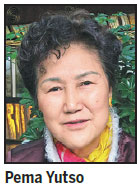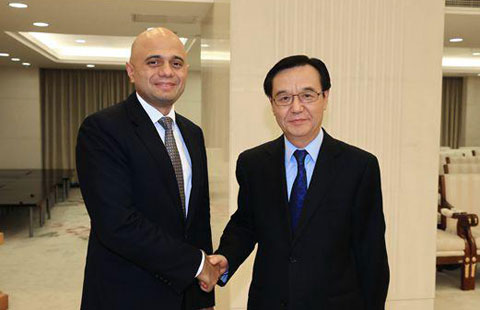Prevention better than cure on the grasslands
Updated: 2016-03-09 08:19
By Li Yang(China Daily)
|
|||||||||
After working as a doctor in Ganzi Tibet autonomous prefecture in Sichuan province for more than 40 years, Pema Yutso has plenty to say about improving medical care in the grassland areas where ethnic Tibetans live.
"The government should refocus on prevention and the control of diseases, rather than treatment," said Yutso, who is a deputy to the fourth session of the 12th National People's Congress, the country's top legislature.
"It is meaningless to talk about how many operations doctors have done on patients living in the grasslands if the source of their illness remains uncontrolled or unmanaged."
Yutso spoke to China Daily in Beijing on Sunday and pointed out that common diseases among ethnic Tibetan people living on the plateau, who now enjoy a much improved standard of living, were similar to those of others on the plains.

But Yutso said awareness among ethnic Tibetan people of healthcare issues was generally weaker than among other residents on the plains.
"If local governments and medical care authorities could pay more attention to raising the plateau residents' awareness of the importance of personal hygiene and of drinking boiled water and creating a healthy living environment, they would end up saving on their medical expenditure," said Yutso.
"An easy thing to do would be to treat dogs with medicines so they no longer have parasites in their droppings. These parasites from dog droppings are a major source of pollution of surface water on the grasslands and they are the cause of many diseases among shepherds and their families."
She said many diseases that are common among the nomads and that can cause lifelong problems are easy to prevent.
She also called on the government to ensure adequate funding for public hospitals, so they can attract more professionals to hospitals in Tibetan regions, and urged more private hospitals to locate to Tibetan regions.
Yutso said the provincial government arranges training programs for doctors who will end up working in Ganzi.
She said she would like to see training offered to doctors and nurses working in Ganzi include more attention for medical ethics and the legacy of traditional Tibetan medicine.
Today's Top News
China scholar praises pragmatic govt work report
China hits back at US over restrictions on ZTE
Longer visas for foreign experts eyed to ease entry
Female condom made in China wins WHO approval
Longer visas for foreign experts eyed to ease entry
Lavrov, Kerry hail progress in Syrian ceasefire
PM Fico's Smer party leads Slovak election: exit poll
Britain to take lead in promoting EU-China trade talks
Hot Topics
Lunar probe , China growth forecasts, Emission rules get tougher, China seen through 'colored lens', International board,
Editor's Picks

|

|

|

|

|

|






